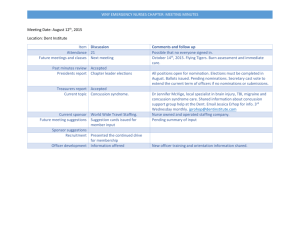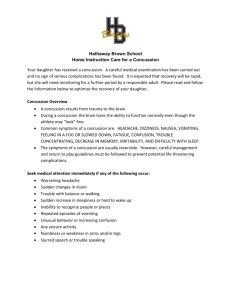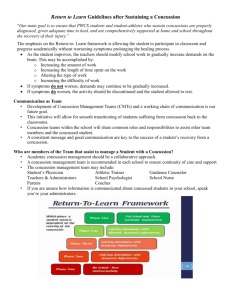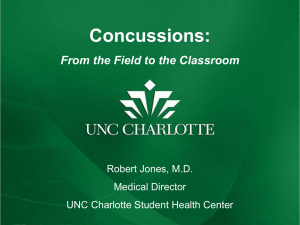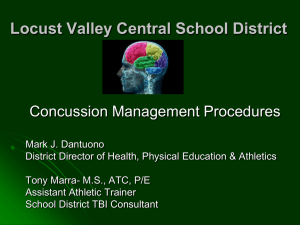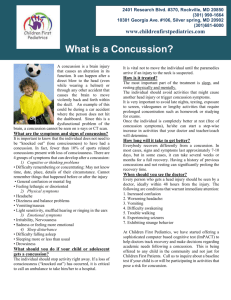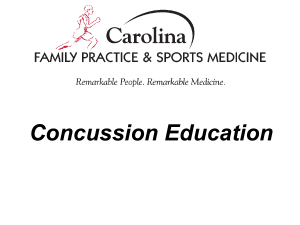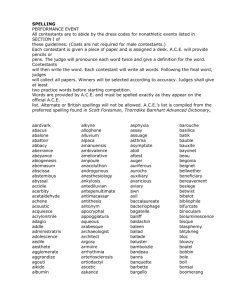Joint Oireachtas Committee on Health and Children Dr. Tony
advertisement
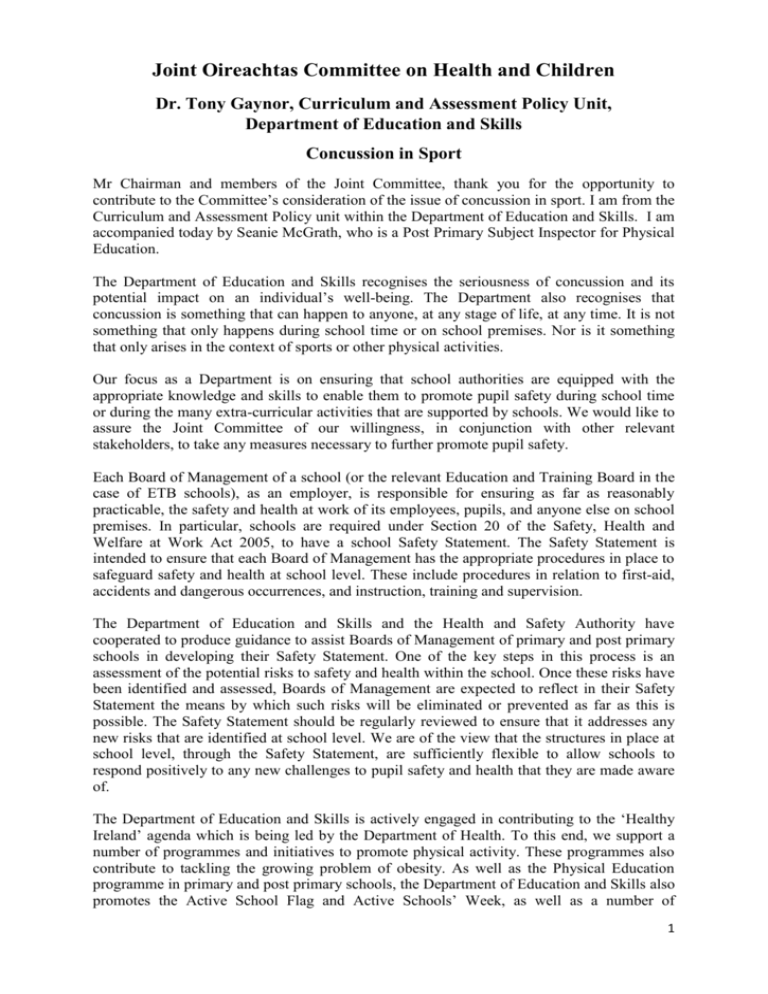
Joint Oireachtas Committee on Health and Children Dr. Tony Gaynor, Curriculum and Assessment Policy Unit, Department of Education and Skills Concussion in Sport Mr Chairman and members of the Joint Committee, thank you for the opportunity to contribute to the Committee’s consideration of the issue of concussion in sport. I am from the Curriculum and Assessment Policy unit within the Department of Education and Skills. I am accompanied today by Seanie McGrath, who is a Post Primary Subject Inspector for Physical Education. The Department of Education and Skills recognises the seriousness of concussion and its potential impact on an individual’s well-being. The Department also recognises that concussion is something that can happen to anyone, at any stage of life, at any time. It is not something that only happens during school time or on school premises. Nor is it something that only arises in the context of sports or other physical activities. Our focus as a Department is on ensuring that school authorities are equipped with the appropriate knowledge and skills to enable them to promote pupil safety during school time or during the many extra-curricular activities that are supported by schools. We would like to assure the Joint Committee of our willingness, in conjunction with other relevant stakeholders, to take any measures necessary to further promote pupil safety. Each Board of Management of a school (or the relevant Education and Training Board in the case of ETB schools), as an employer, is responsible for ensuring as far as reasonably practicable, the safety and health at work of its employees, pupils, and anyone else on school premises. In particular, schools are required under Section 20 of the Safety, Health and Welfare at Work Act 2005, to have a school Safety Statement. The Safety Statement is intended to ensure that each Board of Management has the appropriate procedures in place to safeguard safety and health at school level. These include procedures in relation to first-aid, accidents and dangerous occurrences, and instruction, training and supervision. The Department of Education and Skills and the Health and Safety Authority have cooperated to produce guidance to assist Boards of Management of primary and post primary schools in developing their Safety Statement. One of the key steps in this process is an assessment of the potential risks to safety and health within the school. Once these risks have been identified and assessed, Boards of Management are expected to reflect in their Safety Statement the means by which such risks will be eliminated or prevented as far as this is possible. The Safety Statement should be regularly reviewed to ensure that it addresses any new risks that are identified at school level. We are of the view that the structures in place at school level, through the Safety Statement, are sufficiently flexible to allow schools to respond positively to any new challenges to pupil safety and health that they are made aware of. The Department of Education and Skills is actively engaged in contributing to the ‘Healthy Ireland’ agenda which is being led by the Department of Health. To this end, we support a number of programmes and initiatives to promote physical activity. These programmes also contribute to tackling the growing problem of obesity. As well as the Physical Education programme in primary and post primary schools, the Department of Education and Skills also promotes the Active School Flag and Active Schools’ Week, as well as a number of 1 innovative pilot initiatives such as the ‘Points for Life’ project, which focuses on improving the physical literacy of pupils. We are also centrally involved in the development of the National Physical Activity Plan which is being led by the Departments of Health and Transport. The latest data collated from schools, through the ‘Lifeskills’ survey which was published by the Department of Education and Skills in January 2014, indicate that schools are very active in supporting extra-curricular activities among their students. The data indicate that 81% of primary and 96% of post primary schools promote physical activities outside of the school day. This encompasses a range of pursuits that includes GAA, soccer, rugby, athletics, swimming, hockey and horse riding. The same survey also revealed that 98% of primary and 86% of post primary schools, who responded to the survey, promote physical activity during break-times. Schools are therefore clearly playing an important role in relation to the ‘Healthy Ireland’ agenda. In developing guidance for schools on the topic of concussion we are conscious of the need to ensure that such guidance does not discourage schools from continuing to promote physical activity among their students. The Department views the issue of concussion, whether in sport or otherwise, very seriously. The potential dangers are clearly illustrated by the tragic case of Benjamin Robinson. Following an initial approach to the Department from Benjamin’s father, Peter, officials spoke with him, via teleconference, in January 2014. Mr. Robinson outlined the progress being made at that time in raising awareness of concussion related injuries in Scotland and Northern Ireland. Following that meeting, the information provided by Mr Robinson was circulated by the Department of Education and Skills to the Physical Education Association of Ireland (PEAI) and the Wellbeing team of the Professional Development Service for Teachers (PDST). Such information will enhance the knowledge of physical education teachers to deal with suspected incidences of concussion. Officials from the Department of Education and Skills also made contact with counterparts in the Department of Education in Northern Ireland, who agreed to share the work they were undertaking in this area, and which subsequently formed the basis of their “Recognise and Remove” leaflet which was circulated to all school boards and other relevant bodies in Northern Ireland in May 2014. The concerns of Mr. Robinson were also raised, by Mr. Seanie McGrath, with the members of the National Physical Activity Plan at their working group meeting on 12 February 2014. The Department of Health indicated at that time that it was also concerned about this issue and was interested in promoting awareness of the signs and symptoms of concussion. It was therefore agreed by both Departments that we would ascertain whether there was an interest amongst those organisations currently providing information on concussion to collaborate on an awareness raising campaign for schools. Such organisations include a number of major sporting bodies, particularly the Irish Rugby Football Union (IRFU), Gaelic Athletic Association (GAA) and the Turf Club, as well as Acquired Brain Injury Ireland. Contact was made with the medical representatives of each of these organisations and a meeting was arranged in the Department of Health on 7 July 2014. Members of Acquired Brain Injury Ireland, IRFU, GAA, Football Association of Ireland (FAI) and the Turf Club, along with representatives from both Departments attended this meeting. 2 There was broad consensus among those present at the meeting about the seriousness of the issue of concussion. It was agreed to draft a concussion awareness leaflet for discussion amongst the group, with clear and concise messages to support all those providing and participating in sport or physical activity in schools and elsewhere. There was broad agreement on the type of issues that would need to be covered in such a leaflet. These include material on the Sports Concussion Assessment Tool (SCAT), links to the resources produced by various sports national governing bodies and Acquired Brain Injury Ireland, and reference to the Consensus Statement on Concussion in Sport that was produced in November 2012. While there is broad agreement on the main principles that should inform the leaflet for schools, some additional work is necessary. As this is primarily a medical rather than a pedagogical issue we would defer to the expertise of the relevant health experts, whether in the Department of Health, national sports governing bodies, or Acquired Brain Injury Ireland, in terms of the final content of the leaflet. We are more than happy to advise on any educational related issues that arise in the course of drafting the leaflet. We envisage our primary role, however, to be to circulate the guidance to schools as part of a communications strategy. I would like to conclude by once again assuring the Joint Committee of our willingness to raise awareness of this important issue in schools. We will continue to cooperate with the Department of Health and other relevant health experts in order to ensure that appropriate advice issues to schools. I would be happy to respond to any questions the Committee might have. 3

